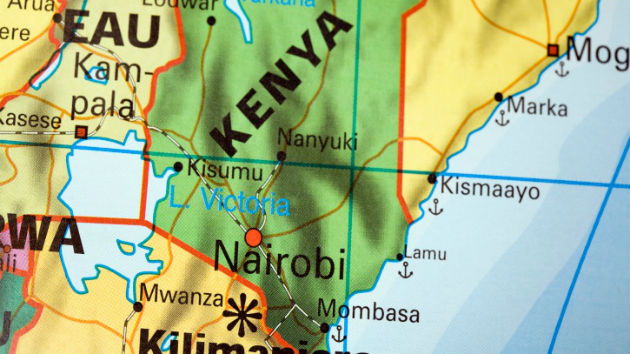Western Officials Fear More Terrorism in Kenya Capital
Published at | Updated at
 iStockphoto/Thinkstock(NAIROBI, Kenya) — Hotels, restaurants, bus stations and a major supermarket popular with expats in Nairobi, Kenya, have been known by western intelligence services for the past year to be under terrorist surveillance, raising fears militants will strike again following the Westgate mall massacre, security officials told ABC News on Thursday.
iStockphoto/Thinkstock(NAIROBI, Kenya) — Hotels, restaurants, bus stations and a major supermarket popular with expats in Nairobi, Kenya, have been known by western intelligence services for the past year to be under terrorist surveillance, raising fears militants will strike again following the Westgate mall massacre, security officials told ABC News on Thursday.
“That is certainly a very big concern of ours,” a U.S. counter-terrorism official in Washington told ABC News. “These targets have received a lot of attention, particularly after Kenya went into Somalia.”
The Kenyan military’s failure to dislodge the Westgate killers for five days has not inspired confidence among allies in their ability to safeguard other city hangouts frequented by foreign diplomats, security officials, tourists and business travelers alike, several U.S. officials said.
The attack inside the shopping mall — which began Saturday and lasted through Wednesday, leaving at least 61 killed and dozens still unaccounted for in the rubble of the wrecked retail complex — was perpetrated by Somali gunmen from al-Shabab likely with help from al Qaeda, officials also said.
Kenyan government forces have been active for more than a year fighting al-Shabab across its border with Somalia. Al-Shabab, which joined al Qaeda officially last year, has been known to operate with an affiliated group inside Kenya once called the Muslim Youth Center and now known as al-Hijrah.
Targets surveilled in Nairobi had included Westgate but also the Nakumatt supermarket, as well as hotels and restaurants popular with westerners in the city, the U.S. counter-terrorism official told ABC News.
A former senior western security official who is based in Nairobi said the intelligence “wasn’t specific” about a looming attack, but was worrisome to officials trying to anticipate “revenge violence” by a weakened but more dangerous al-Shabab.
“Chatter about commercial targets was picked up by intelligence services,” the former security official in Nairobi told ABC News. “Other targets known to have been surveilled were mainly in the city center — bus stations, the parliament and archives — not big commercial targets like Westgate.”
As a large FBI team of specialists from New York joined Kenyan officials sifting through the rubble-strewn carnage in the shopping mall on Thursday, some experts and officials said that the al-Shabab attack bore hallmarks of a sophisticated al Qaeda operation.
“While al-Shabab has not previously had a reputation for launching overly sophisticated attacks, various other al Qaeda groups certainly have,” said Robin Simcox, a terrorism expert at the Henry Jackson Society in London. “It would not be a surprise if al-Shabab was now also embarking on increasingly well planned terrorist operations.”
The slaughter of Kenyans and western shoppers in the upscale mall involved meticulous planning and clearly the pre-positioning of light machine guns, AK-type rifles and hand grenades, sources said. One Kenyan source said a retail space had been rented out for several months as a clothing shop to provide a place to stash the weapons in advance, so the attack cells could penetrate the mall without drawing attention.
“You don’t just walk into that mall carrying large belt-fed machine guns and laden with grenades. It all had to be stored nearby,” the U.S. counter-terrorism official told ABC News.
The weapons likely were smuggled in piece by piece “over time,” the U.S. official added.
Though al-Shabab, meaning “The Youth,” has carried out hundreds of deadly attacks against Somali government and African Union troops and a few attacks inside Kenya — including suicide bombings perpetrated by several American recruits — none were comparable to Westgate.
Only a 2010 bombing of civilians watching the World Cup in Kampala, Uganda, which killed one American, rivaled the level of operational planning and security the Westgate attack had to have required, experts said.
Before the Uganda attack, al-Shabaab moved weapons across the border and operated safehouses in both Somalia and Kenya, a retired FBI agent involved in that investigation said.
“This operation [at Westgate] required guns, grenades and people – and lots of planning,” the U.S. official said.
Despite Kenyan officials’ statements that American recruits may have been involved in al-Shabab’s weekend assault on Westgate, U.S. officials have maintained they have nothing to back that up yet.
At a briefing with reporters Wednesday, Attorney General Eric Holder said, “We don’t have any verification that any Americans have been involved in the attack as attackers, and so we are still working with our Kenyan colleagues to get granularity and fidelity as to what the truth is to that matter.”
A U.S. military expert on al-Shabab said new consideration must be given to al-Shabab as a threat to the West – including the U.S. homeland potentially – because al-Shabab has clearly “crossed the line on external operations” with Westgate, given its brazenness, sophistication and success.
“It’s a wakeup call to western intelligence services,” the military source told a ABC News.
Copyright 2013 ABC News Radio


